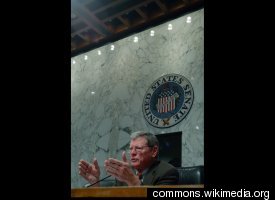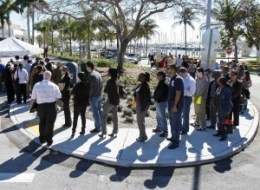AP/The Huffington Post First Posted: 11-15-10 09:42 AM | Updated: 11-15-10 09:42 AM
PITTSFIELD, Mass. — On land poisoned by toxins from a long-gone manufacturing era, more than 6,500 solar panels face the south sky, capturing the sunlight of a late autumn day in the Berkshire Mountains.
They're ready to deliver power to New England.
The Western Massachusetts Electric Co. site in Pittsfield, New England's largest solar project, promises to produce enough electricity for about 300 homes starting later this month. That's a tiny fraction of what the region needs to run computers, lights, TVs and everything else utility customers take for granted.
But the $9.4 million solar plant and an even larger project planned for Springfield next year are expected to spur job growth in the solar industry and eventually make the cost of solar power competitive with the oil-burning furnaces that are common in New England.
"What we'd like to do is open a new sector," said Carl Frattini, director of business development at Western Massachusetts Electric.
The cost to install smaller scale rooftop solar panels is about $8,800 per kilowatt, he said. However, increasing the efficiency of production with large projects reduces the cost to about $5,200 per kilowatt, he said.
Ian Bowles, the state's secretary of Energy and Environmental Affairs, said that although solar power represents less than 1 percent of electrical use in Massachusetts, it is not subject to price volatility common with rising and falling oil and natural gas prices. So the rates consumers pay are more stable.
Solar power still is far more expensive than fossil fuels, but its rates are down by almost a half in just a few years, he said. It's on a trajectory toward parity with traditional sources of energy in the region.
"Then it will really take off," he said.
But don't get rid of that oil-burning furnace yet.
Philip Jordan, head of Green LMI Consulting, a Mendon, Mass., work force and economic consulting firm, said technology still has far to go to push down prices. Renewable energy depends to a certain extent on government spending, which could fall as public officials close budget deficits, he said.
"It's hard to know how fast things will ramp up in terms of efficiency of scale," he said.
Nationally, the solar industry employed 93,502 workers as of August, about double from the previous year, according to a report by the Solar Foundation, a research and education group. In the next year, employment is expected to jump 26 percent, adding nearly 24,000 jobs, despite the weak recovery from the worst recession in decades, the group said.
Paul Gromer, executive director of the Solar Energy Business Association of New England, said the trend in solar construction nationally is toward larger plants. He said improvements in manufacturing have pushed down costs, and installers are becoming more efficient with each new project.
"It is small but growing very, very rapidly," he said.
Fouad Dagher, manager of energy products and services at National Grid, which is installing five megawatts of utility-owned solar power at five of its locations in Massachusetts, said equipment manufactured overseas also is pushing down prices.
"The more we do the more the prices are coming down," he said.
Though Gromer called Massachusetts a "hotbed for the solar energy business," New Jersey and Florida are home to larger solar projects. In Pilesgrove, N.J., Panda Power Funds of Dallas and Con Edison Development of Valhalla, N.Y., are developing a 71,000-solar panel project on a 100-acre farm. It is set to generate 20 megawatts by April or May, among the handful of largest solar farms in the nation.
A 25-megawatt facility opened last year in Arcadia, Fla.
Massachusetts legislation signed into law by Gov. Deval Patrick in 2008 helped push development of solar plants locally, Frattini said. The Green Communities Act permits utilities to generate power from solar plants, an exception to the prohibition against generating power that was part of deregulation more than a decade ago.
And to resolve another problem – the need for large tracts of land to house row upon row of solar panels – Western Massachusetts Electric looks to abandoned industrial and commercial areas and former landfills, which are relatively inexpensive. The company plans to use a capped landfill in Springfield for its next solar plant. And its eight-acre Pittsfield property, once used by General Electric Co. to make transformers, was fouled by PCBs.
The site of the 1,800-kilowatt plant in Pittsfield, with its 33 rows of solar panels in an out-of-the way industrial park, is less obtrusive – and less contentious – than alternative energy such as wind turbines.
"I know aesthetics depend on where you stand," said Western Massachusetts Electric project manager Bill Blanchard. "But I love it."
Get HuffPost Green On Twitter and Facebook! Know something we don't? E-mail us at Huffpostgreen@huffingtonpost.com










 After several years of cat-and-mouse games with Mexican smugglers who tunnel under southwest land crossings, Customs and Border Protection has had to play defense in the air.
After several years of cat-and-mouse games with Mexican smugglers who tunnel under southwest land crossings, Customs and Border Protection has had to play defense in the air.


